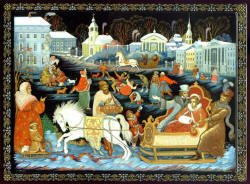 At last count by the Russian speakers in the chorus, the song contains 11
different words for "sadness." Zimn'aya doroga, or Winter
Road, by Vissarion Shebalin (1902-1963), is among the works to be performed
by the Russian Chamber Chorus of New York in their upcoming concert series, "The
Spirit of Old Russia II" in January 2014. Winter Road, on its surface,
might represent precisely the type of piece a casual observer might think up to
embody the "Russian spirit": the lyrics by Pushkin, Russia's grand
literary master, paint for us the scene of a carriage winding its way through a
somber, snowy landscape; a traditional bell-and-troika melody evoke a
particularly Russian sense of time and place.
At last count by the Russian speakers in the chorus, the song contains 11
different words for "sadness." Zimn'aya doroga, or Winter
Road, by Vissarion Shebalin (1902-1963), is among the works to be performed
by the Russian Chamber Chorus of New York in their upcoming concert series, "The
Spirit of Old Russia II" in January 2014. Winter Road, on its surface,
might represent precisely the type of piece a casual observer might think up to
embody the "Russian spirit": the lyrics by Pushkin, Russia's grand
literary master, paint for us the scene of a carriage winding its way through a
somber, snowy landscape; a traditional bell-and-troika melody evoke a
particularly Russian sense of time and place.
But every piece in the choir's concert program asks us to go deeper in our own understanding of the Russian musical soul. For Winter Road, chorus director Nikolai Kachanov explains, evokes a spirit that can be described as Russian not only because of the above-mentioned elements but because the composer "caught the music and tonality of the text, and the text is so incredibly Pushkin"—that is, infused with a poetry, rhythm and coloristic background so unmistakably, quintessentially Russian. You can't pinpoint exactly in the piece where that spirit emerges, says Kachanov, but after the final chord dies away, as if into a silver wall of snow, you know you have felt it.
While the Spirit of Old Russia I, performed by the choir three seasons prior, focused on the musical impact of the Western ideas flowing into Russia during the period of Peter the Great, this concert explores what it means to try to divide Russian music into traditional categories of folk, classical and sacred, and to show how Russian music challenges such an easy division. Indeed, the intangible depth of Winter Road is just one of many surprises on the program that expand our notion of Russian music.
For example, the concert begins with the crisp Baroque polyphony of Dmitry Bortnyansky (1751-1825), a Ukranian trained in Italy. Bortniansky's sacred concerto for two choirs, Slava vo vyshnikh Bogu (Glory to God in the Highest), is a grand example of a work by a composer whose influence laid the foundation for the development of a modern Russian musical style. In another moment in the concert, in full contrast to these high classical sounds, folk songs blast from the stage, performed in traditional vocal style, as opposed to a more "trained" classical one. Then, in other pieces, such as Pol'ya Neogl'adniye (Boundless Fields) by Alexander Kastalsky (1856-1926), folk intonations return to infuse modern harmonies with a sense of mystery and timelessness. These stylistic contrasts, and these folk melodies reappearing in their various forms throughout the concert, are but a few of this concert program's challenges to easy musical divisions.
The personal, reflective nature of musical expression found throughout the program also reminds one of something older than Western notions of music creation: the Russian tradition of people gathering at night at someone's home and huddling close around the table to sing together. An unusual version of that intimacy finds its way to the modern era in the backstory of three sacred choral miniatures by Nikolai Golovanov (1891-1953). These subtle, expressive pieces were composed in secret when Golovanov was the beloved head of the Bolshoi Theater, in an era when Stalinist control extended into the arts. Golovanov would have never heard these songs performed professionally in his lifetime. If he heard them at all, it would have been an impromptu performance, done quietly among a few friends at someone's home. These pieces are so real, Kachanov explains, so "not for sale."
Golovanov would likely have agreed with Kachanov's interpretation of the spirit of old Russia: "It is not something that existed in the past and ended centuries ago. Or something that existed geographically and then was lost. For me, it always exists -- it's like the air."
As winter in New York sets in, come in from the cold with a choral concert of the music of Shebalin, Bortniansky, Kastalsky and Golovanov. In addition, our program will feature works from Yegorov, Chesnokov, Grechaninov and Krylov. We'll be joined by musicians Anatoly Trofimov and Tamara Volskaya on the traditional Russian folk instruments the bayan and domra, respectively.
The Russian Chamber Chorus of New York (www.rccny.org) performs "The Spirit of Old Russia II" on Saturday, January 11 at 4:00 PM at St. Charles Borromeo Church, 1 Aitken Place / 19 Sidney Place, Brooklyn; Sunday, January 12 at 4:00 PM at Holy Trinity Lutheran Church, 65th Street and Central Park West, Manhattan; and Wednesday, January 15 at 8:00 PM at Holy Trinity Roman Catholic Church, 213 West 82nd Street, Manhattan. Tickets at the door are $25; $20 for students/seniors. For discount tickets and more information, visit www.rccny.org/ConcertSchedule.html.
Jason Zahorchak is a tenor enjoying his third season with the Russian Chamber Chorus of New York.
